Beanie Feldstein: “Friendship Is My North Star”
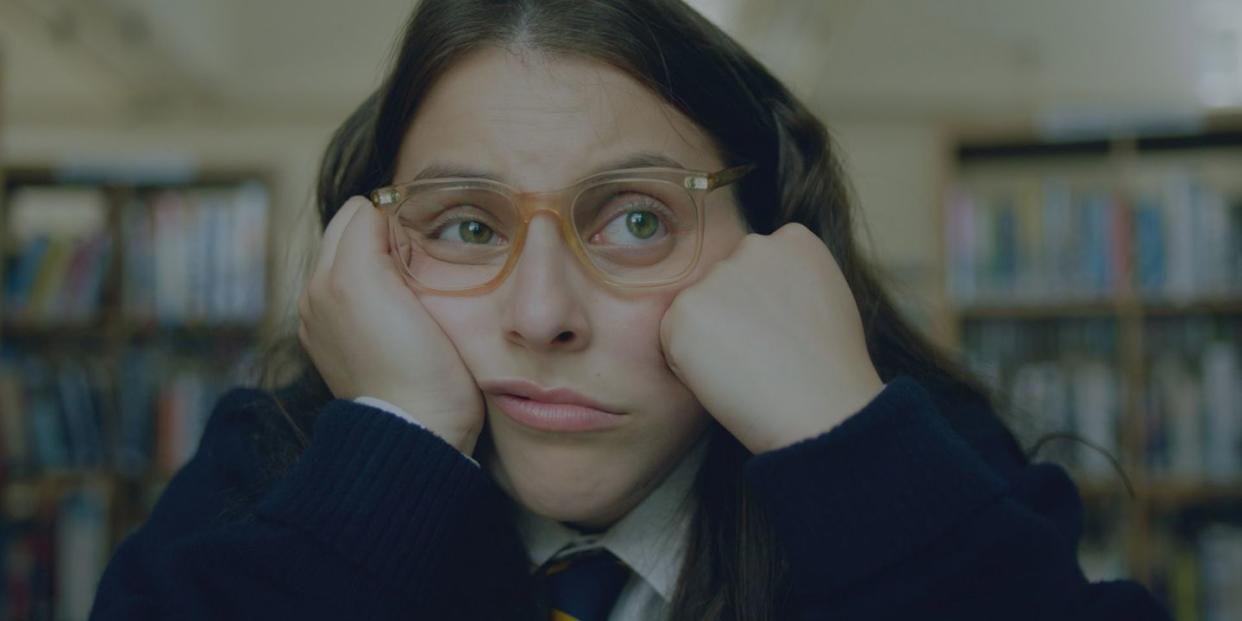
Beanie Feldstein has a knack for choosing roles that bring you back to another time in cinematic history. To a time, perhaps, when four friends in search of a dead body was the most compelling content—and not because of the dead body, but because the journey they were on reminded you of your own, of the meaning of friendship, of the importance in seeking out the adventures that made you feel alive. Her latest film, How to Build a Girl—based on the beloved Caitlin Moran book of the same name—stays the course.
Feldstein stars as Johanna Morrigan, a high school student and aspiring writer from Wolverhampton, England in the early ‘90s. She is earnest, funny, confident, and wholly herself. And yet, like any other 16-year-old, she’s completely and utterly lost. Her parents are consumed by her infant siblings, and her closest friends are the photos of her idols (think Jo March, Sylvia Plath, Sigmund Freud) plastered on her bedroom wall, who, when spoken to, come to life to provide solace and guidance.
When an opportunity arises to write for a local music magazine, Johanna sees a path to providing for her family while simultaneously exploring a life beyond them, as she reinvents herself as Dolly Wilde, a cutting, too-smart, badass rock critic. It’s a little John Hughes, a little Almost Famous, and a whole lot of heart.
Feldstein wasn’t familiar with Moran’s book before working on the movie, but she was instantly hooked as soon as she began reading. “Caitlin has this magic—it’s true magic—to reach out to women and capture their experience but in this wholly unique, deeply specific sparkly way,” she says.
But as much as she was exhilarated by the story, she was also intimidated. As an American actor starring in a British film loosely based on English writer Moran’s life, she wanted to approach the project with utmost respect. So, part of her preparation included moving Wolverhampton and working at a small artisan shop to become familiar with the area and perfect her local accent. (She’s still in a Facebook group with her former coworkers.) “I am such a homework obsessive person,” Feldstein, a former sociology major, says. “I love working hard, I love research.”
The result of Feldstein’s efforts is an endearing portrait of a teenage girl finding herself and her tribe that somehow also transcends the coming-of-age experience. Here, the actress talks to BAZAAR.com about finding her tribe, her bond with Moran, and why we should remind ourselves that we're okay.
This movie so special. I think a lot of things that you do are reminiscent of films from my youth. It was giving me some Almost Famous vibes, a little Clueless, a little John Hughes …
Thank you so much. I mean, of course Almost Famous is such a reference for our movie but, Coky, our director, was amazing. Before I moved to England or anything, she gave me all of these films to watch and the list was so funny because it was so vast and so varied in an amazing way. I think you kind of sense that in the movie.
I’m so curious to know what films were on that list!
Almost Famous was such a north star but I also remember her talking to me a lot about Little Miss Sunshine, especially for the family dynamic. Bringing that dark humor, especially with Paddy Considine, who is such a brilliant actor—he’s genius in the movie—bringing that dark comedy genius for the Morgan household. And then 24 Hour Party People and all of these other films. Almost Famous was the first one that I watched.
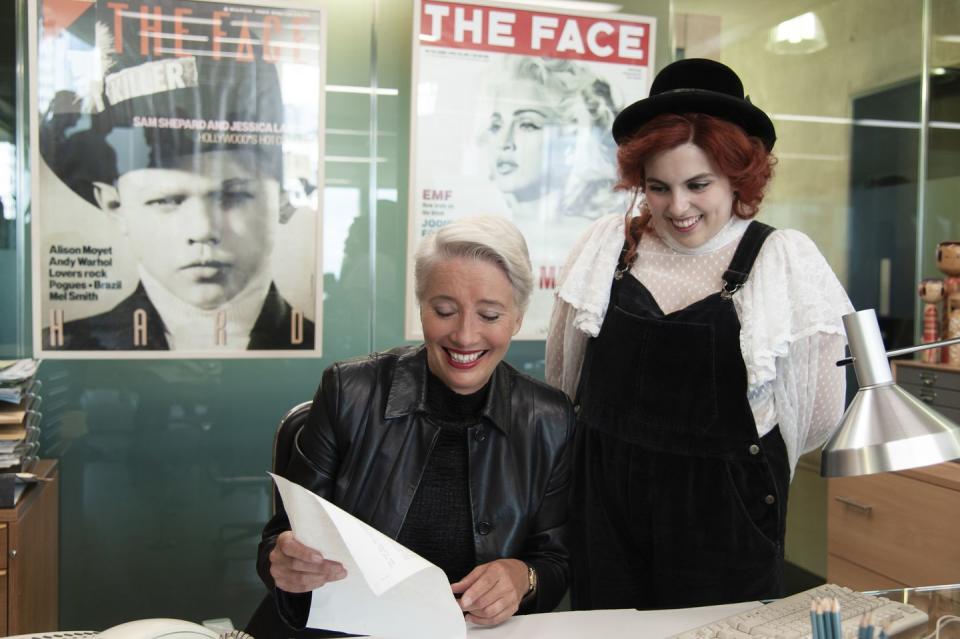
What a great education, while also being able to do the job you love, to learn in this way.
Literally all I do is learn. I feel like I am a student to the incredible people I get to work with. Most of them are younger than me, even. I remember sitting across from Saoirse Ronan, doing Lady Bird, and Kaitlyn Dever doing Booksmart—they’re both younger than me, but I just felt immensely grateful to learn from them because I do feel like they are wise and they are power-house actors no matter what their age. But then of course, Paddy Considine…
Had you seen In America before you worked with him? I’m sure you’ve seen it.
You know, I’ve never watched it. … I have this thing where if I know I’m about to work with someone, I can’t watch anything new of theirs.
So I’ve seen so much of his work but I hadn’t seen that one and I can’t watch it because then I get too nervous. I remember with Saoirse, the year of Brooklyn was when I got cast. And I watched Brooklyn three times, just by myself. And then when I got the call, I was like, “You’re cut off. You’re not permitted to watch one more Saoirse movie and I just feel that way about everyone that I’ve worked with.” With Paddy, I was like, “I have to not think of what a fan I am of his.” He’s a master of his craft I have to just look at him and meet him as Paddy and see him as my father when we’re working together and try to get those nerves out of my brain. That’s my rule with myself, nothing new.
I think a lot of girls will be able to relate to this film. It almost transcends age in a funny way. Johanna's so confident and so wholly herself, and yet there’s this feeling of being a bit lost, and discovering herself. And I feel like that’s a process that never really ends.
Absolutely. What I love about Johanna, she’s a multitude of contradictions in some ways. She’s truly the most optimistic, positive, joyful girl at the top of the film, and yet, she wants more. And both of those things can exist at the same time. I love that in her. Caitlin’s greatest gift, which as her friend and her sort of mentee and her vessel for her story, but also just as her reader, I feel like her greatest gift—and it’s so beautifully translated in her screenplay—is giving women, and maybe not just women, permission to make mistakes and to not let those mistakes define you, but rather incorporate them to become a more complex, fleshed-out version of yourself. You’re not defined by your mistakes but you’re also not going to pretend they didn’t happen. You’re going to fold them into your own identity. And I think all of us could use that reminder.
I feel like the movie is asking people to be kinder to themselves. I definitely need that lesson right now. The world is going through the most frightening, unprecedented time and I think we all expect so much of ourselves to be doing the right thing or thinking or feeling the right thing right now. And what I love about Caitlin on a broader scale, obviously, it has nothing to do with the current crisis, is I think we could all use that little jolt of a reminder of, You’re okay. And you might have messed up, and that’s okay. You fold it into the person you are and you become greater. You become stronger. That final monologue of the movie—more than the sex and the rock and roll of it all, I was most afraid of that monologue because it meant so much to me, reading it, and it always made me so emotional.
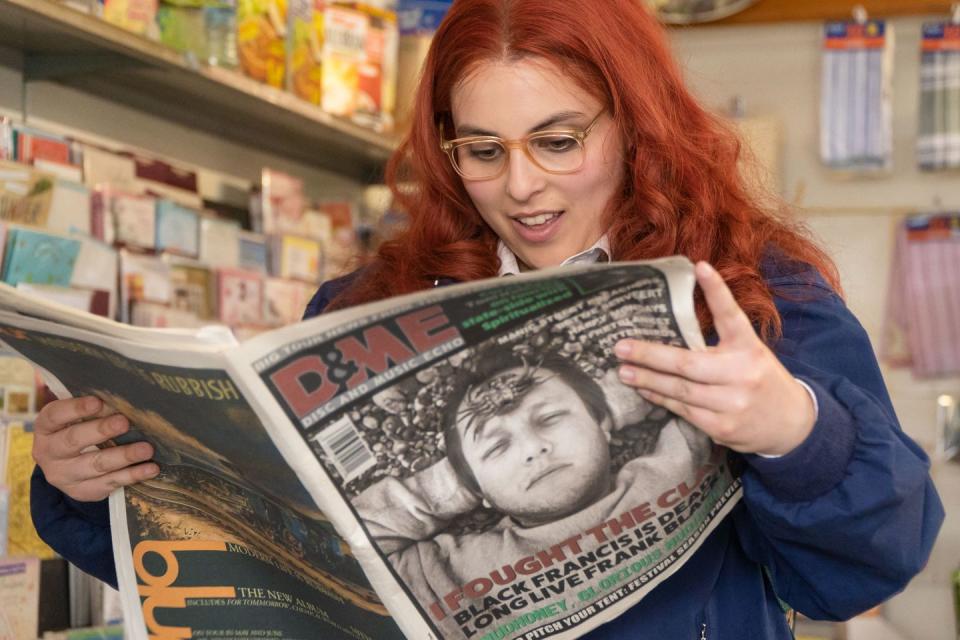
It’s earnest in the good way.
That’s what Caitlin’s gift is, though, it is. She’s earnest in the good way. She’s heart-warming in the good way and still so freaking funny. And you know, outlandish at times. I don’t have nieces, but my nephews have a best friend who lives four doors down from my parents and I remember thinking, “Just say this to Emma.” There were definitely moments where I was like, “I’ve never worn something this risqué in my life.” Or, “How do I do this scene by myself?” There were so many new challenges in the film, but I just kept saying, “Do it. You can do it because you wish someone could have done it for you when you were fourteen.”
When you’re 16, everything feels so fatal.
Yes, the stakes are so high.
So high. And it’s only in retrospect that you realize that these are the things that make us who we are, and it’s actually just the opposite of fatal. It’s what makes you a living, breathing human.
Absolutely. What I loved so much about Lady Bird and Booksmart is that they are a celebration of two very different but very complex female friendships, and that is so rare. But what I loved about How to Build a Girl that was such a challenge for me was how we often talked about how this is a story of a girl who isn’t lucky enough to find her person so young and she doesn’t have that support of a best friend. And what happens when you don’t have that person. She has Krissi, her older brother, who’s incredible and played by Laurie Kynaston, who I just love. They have such a beautiful connection. But at the end of the day, it’s her brother! It’s not her best friend, it’s family, and that comes with its own sort of territory. What happens if you’re out there on your own? And how does that work? I think that’s also a really important, different depiction of the female teenhood experience because not everyone is lucky to find their Amy.
I felt like there was a message in there about the importance of finding a group of people who accept you as you are, and what happens if it takes you a bit longer to find. How important has that been to you personally, in kind of finding yourself in your own life?
Oh my God, I don’t know where I would be without my friends. I always say, friendship is my north star. I’m so lucky in that my best friends to this day—I mean, I’ve added so many beautiful friends along the way—but I found my tribe in high school. I found my people in high school, but it’s not always that, and not that high school was easy for me, but it was easier because I had my people. And I wish that for everyone, but I know that it’s not everyone’s experiences. Some people find their people in elementary school, some people find them in college, some people find them in their thirties. People find them at all different times. What I always want to do is be a part of telling different stories, because if we continue to tell the same narrative over and over, it’s not inclusive of the human experience.
I loved tapping into a different side of the teen years. Or looking at it from a completely different perspective. There was such a shift, even in my body and going to work every day, of going alone. I was so used to having these incredible angel girls that I got to go to work with every day and learn from, and there were often scenes with Johanna where she’s out there on her own. I was so new to even filming scenes by myself. Just something technical and simple like that. And it really played into how I experienced her. I think it’s really important to celebrate that person, too. To celebrate the girl who is talking to her walls in her room.
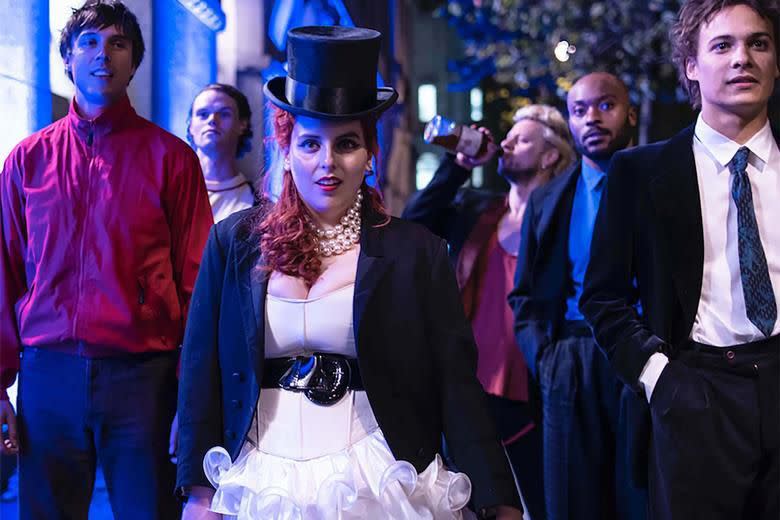
I loved the wall. She’s so wise beyond her years. Julie Andrews, The Brontes, Jo March, they’re her heroes that she goes to for solace and guidance. Who would have been on your wall, growing up?
Sondheim, of course. Carole King. That’s a huge one for me. Adele. Although she didn’t really start until later. She counts. She always counts. Melissa McCarthy. Sandra Oh. I worship at the altar of Sandra Oh. Eleanor Roosevelt. I’ve always loved Eleanor Roosevelt.
I don’t know if you can pinpoint it, but if you could, what do you hope would be the audience take away from this film?
I touched on it a little bit earlier, but I feel like How to Build a Girl explores so many things. But it does start and end with the message of, “You’re doing your life and you’re being your person for you, and not for anybody else.” For some people that might be a boy or their teacher or their parents or society at large, their community or religion. I think the film is extending a hand, as Caitlin always does, and saying, “I’ll respect you no matter who you are, but you have to be who you are for yourself. As long as you’re kind.” I think there’s such a celebration of kindness in the film….
Well I was going to say! I do love that they show her going through the times when she’s not true to herself.
Absolutely! We’re not all perfect. She’s given this opportunity of a lifetime, also one that she needs financially for her family. I always came back to, you have to do what you need to get by. The boys at her company, all boys. Men. She’s a kid, for all intents and purposes, and they’re adult men and they’re all saying, “If you don’t get it together and start ripping people apart in our magazine, you will be fired.” So at first, it’s a means to an end. I live for that line, it’s pure Caitlin, “If I want to get ahead, I’ve got to get a hate.” It’s so Caitlin and it’s so brilliant. But it’s true, I need money for my family and I’m also really enjoying getting to express myself because I love writing. And she’s a brilliant writer, and so I can do what they’re doing. And I’ll just do that. And then it becomes intoxicating.
And you understand why. You don’t blame her!
Of course. I lived and breathed that script for so long that I could tell you what page number and everything, but there’s a great line in the voiceover which is like, “When you go over to the dark side, it doesn’t feel dark at all. You can’t see the darkness because you’re so accustomed to it.”
I think the movie is such a celebration of kindness but not without showing that she doesn’t always have it every minute of every day, which I also think is a really important lesson even for me to learn because I always try to be as compassionate and kind and not judgmental and everything that I want for myself, but sometimes you trip. I love that you really are in this journey with this young, positive, optimistic, imaginative young woman and we are always on her side, but we watch her do some things that are not always kind, you know? Go on that journey, but repent and apologize.
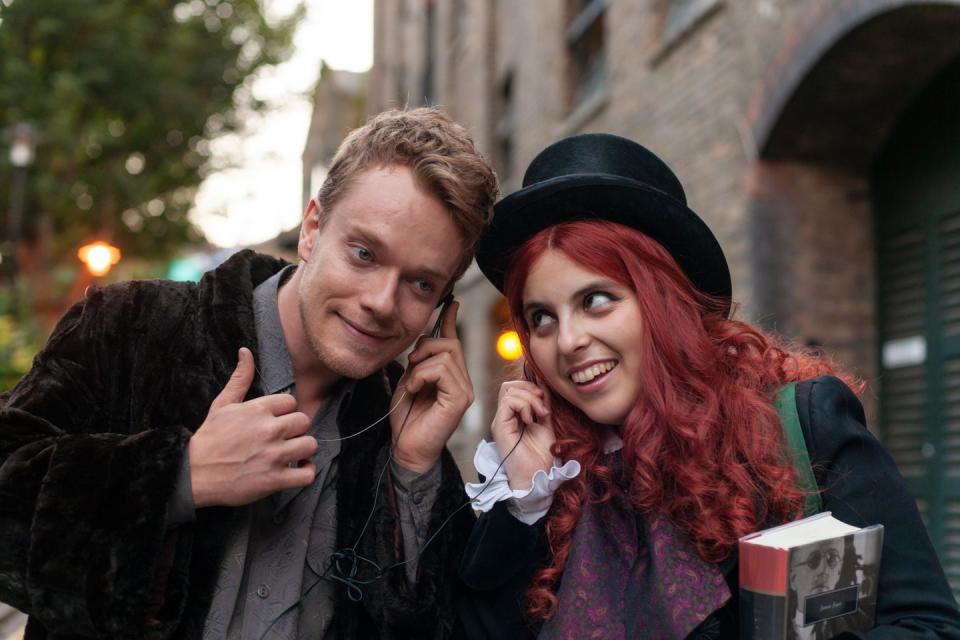
It’s a profound lesson to learn. How much responsibility did you feel in bringing this to life?
I will never forget; I was so nervous when Caitlin came into rehearsal. I had already met her. I got to meet her at my audition—I had met her many times and she is the most delicious … she is a warm hug. A warm hug with the most brilliant brain. She gets to be both. I don’t understand. I don’t have the brain, I am just the hug. But I was so nervous in rehearsal, and it was like as if I had never met her before. And it was before we started filming, like a couple days, and she did one of the kindest things anyone has ever done, and it was so subtle, which was that she emailed me after the rehearsal and she goes, “Do you like to swim?” That was the entire email. And I was like, “Yes.” And she was like, “Can you be at this place at this time on Saturday?”
She took me to the Ladies’ Swimming Pond in Hampstead Heath. They have an all-male—no matter how you identify—pond. But there’s a natural pond in the most beautiful part in North London, and this one’s the all-lady one. I remember standing at the gate, and looking at her I was like, “Did you create this?” Because it’s just so Caitlin, all-ladies swimming pond in the middle of North London. And she was like, “No this is a London, sort of, safe-haven and safe space for us gals in the big city.” And she took me swimming. It’s one of my most favorite afternoons of my entire life. She didn’t talk to me about the character. We just gabbed. We just got to know each other. It was truly one of the greatest gifts anyone has ever given me because it was one of my greatest memories and the most special afternoon. She just, without saying anything, took my nerves away. She just was like, I just want you to be you, and I know you’re going to do your best. She didn’t say any of this, but in how she was treating me.
She was so giving of her story and I think that’s something that’s reflected across all of her work, whether it’s fiction or non-fiction, because How to Build a Girl is a novel. But as we say in the movie, it’s based on a true-ish story, which I love. It was such a great combination because I had Caitlin for any questions I might have, anything I wanted to know, anything I wanted more drawn out, or reference photos of her as a child, anything like that. But also she said, my character is not named Caitlin Moran, that is Johanna Morrigan and you can make her, because you are her in some ways. And that was such a gift. That afternoon, I have chills just thinking about it, was one of my favorite moments of my life, but also the most giving thing. Handing a piece of yourself to someone else and saying, she’s also part of you now.
This interview has been edited and condensed for clarity.
You Might Also Like


